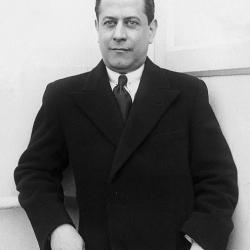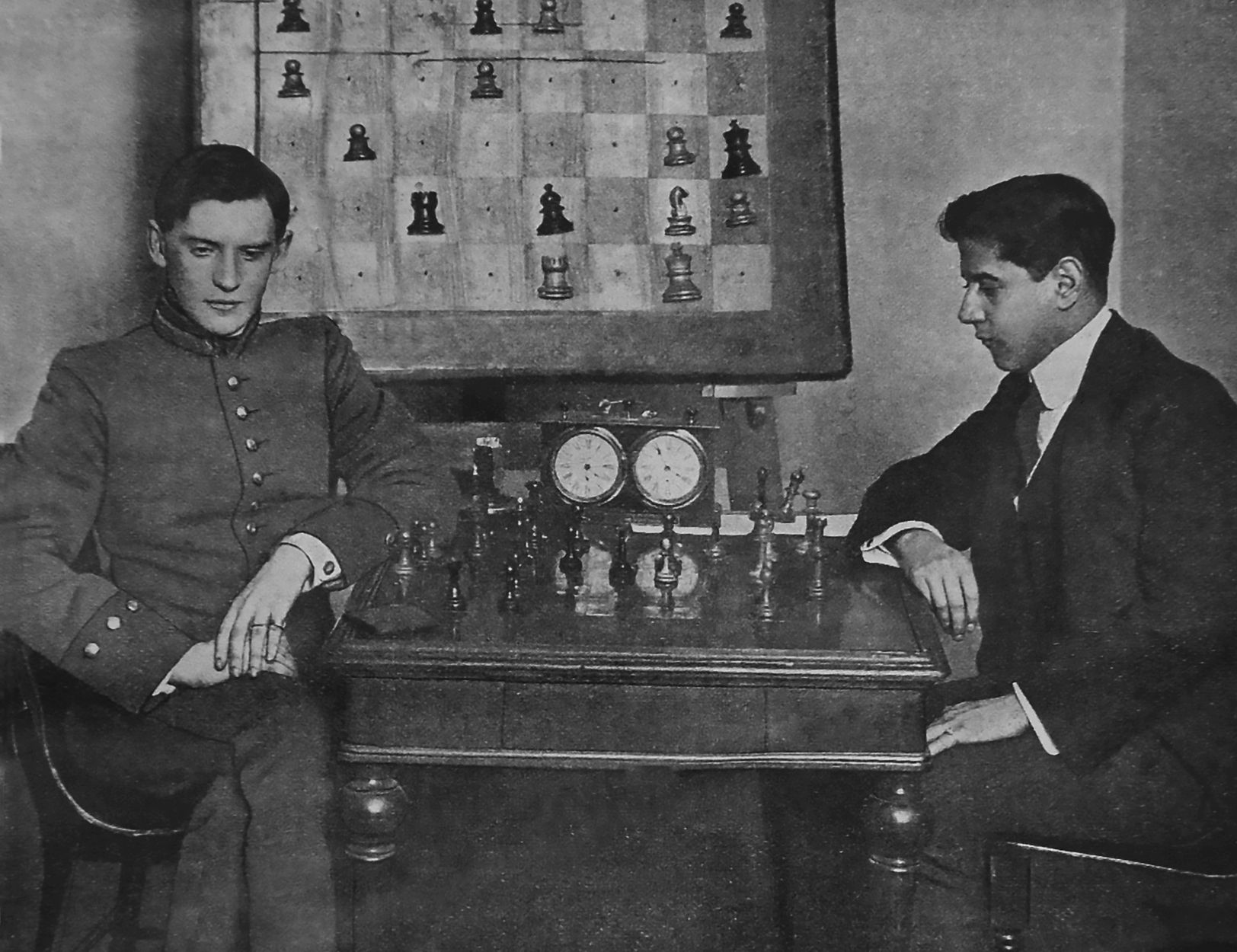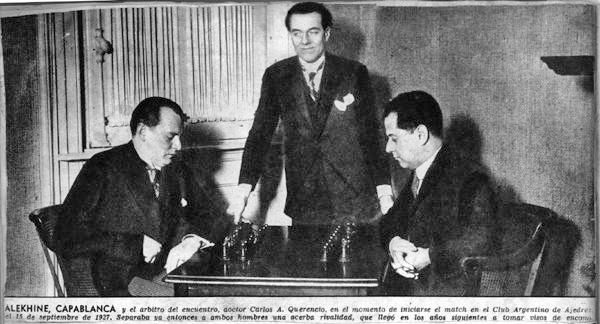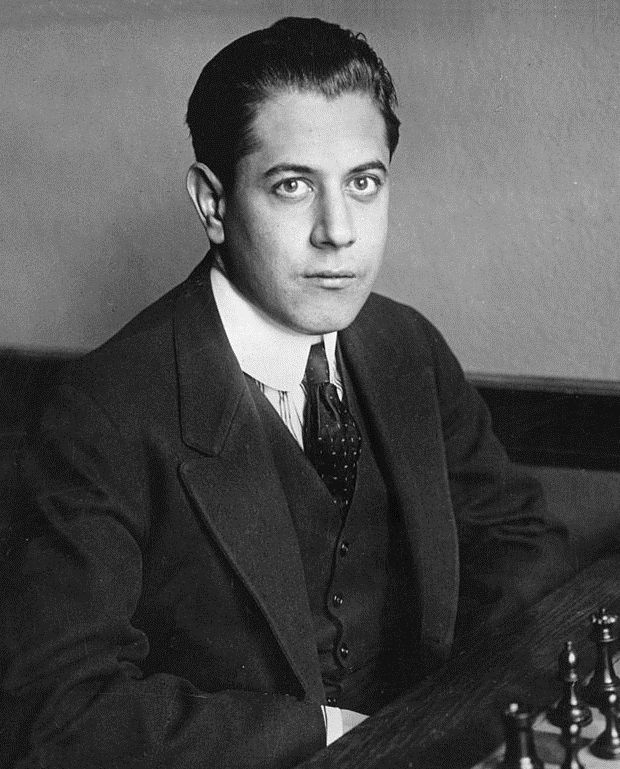Jose Raul Capablanca

Bio
Jose Raul Capablanca was the third world chess champion (1921-1927). He is widely accepted as one of the greatest players of all time. During an 8-year period spanning from 1916-1924, Capablanca did not lose a single tournament game! His record of 40 wins and 23 draws over this period (where he also became world champion) was unprecedented.
- Style
- Early Life and Rise to Prominence
- International Play and Contender
- War Years
- World Championship Match Versus Lasker
- World Championship Match Versus Alekhine
- Life After the World Championship
- Legacy
Style
Capablanca's style is well known to consist of fantastic positional, tactical, and endgame skills. He was also known for his quick speed of play, as well as an unmatched ability to look at a position briefly and come up with the best move - almost as if he was a computer. His endgame technique was so flawless that he garnered the nickname “Human Chess Machine”. Here is a classic example of Capablanca's famous endgame technique:
Early Life and Rise to Prominence
Capablanca learned to play chess when he was 4 years old. At the age of 8, he started playing at the Havana chess club. By the age of 13, he narrowly defeated the Cuban Champion, Juan Corzo, in a match. He continued to play well and progress throughout the early 1900s, before moving to New York in 1905 to attend Columbia University.
It was in New York that Capablanca joined the Manhattan chess club and began to make a big name for himself. In 1906 he won a rapid tournament, ahead of the world champion at the time, Emanuel Lasker. He eventually dropped out of Columbia University in order to focus on chess. Capablanca would continue his success over the coming years, often traveling around the US performing simultaneous exhibitions. His success in these exhibitions allowed him to play a match versus the US Champion, Frank Marshall, in 1909. Capablanca won the match convincingly.
International Play and Contender
In 1911, Capablanca was invited to his first large international tournament in San Sebastian, Spain. To the chess world's surprise, he won the tournament ahead of Nimzowitsch, Rubinstein, Marshall, Bernstein, Vidmar, and Tarrasch (the world's best, excluding Lasker). This victory gave him enough credit on the world stage to challenge World Champion Lasker. Unfortunately, Lasker and Capablanca could not agree to terms, so the match did not happen at this time.

In 1914, Capablanca played in the famous St. Petersburg tournament against the world's best. He started off the tournament as the sole leader, clearly winning the first stage. Unfortunately, he could not hold up in the very last rounds which resulted in a second place finish for Capablanca (1/2 a point behind Lasker, but 3 points ahead of 3rd place Alexander Alekhine). Nimzowitsch thought that Capablanca's stumble at the end of the tournament was because we was simply unaccustomed to losing, or how to proceed after a loss. During the St. Petersburg tournament, Capablanca was giving time odds in blitz games of 5 minutes to 1 minute against the other tournament participants, and was beating everyone.
War Years
Unfortunately, World War I started after St. Petersburg tournament. The War put international chess tournaments on hold for almost 5 years. Capablanca won tournaments in New York from 1914-1918, and easily defeated Borislav Kostic in a match. The match with Kostic was supposed to be the first to 6 wins, but Kostic resigned the match after losing the first five games. Here is the 4th game of the match, where Capablanca displays fantastic endgame technique:
In 1919, the first international tournament since WW I began in Hastings. Capablanca won this tournament with ease, scoring 10 1/2 out of 11 games. In the beginning of 1920, Capablanca and Lasker agreed to terms to play for the World Championship title in the following year. He would finally have his chance at the title.
World Championship Match Versus Lasker
The Capablanca-Lasker match was played in 1921 in Havana, Cuba. The match was scheduled to be over when one player reached 6 wins. However, Lasker resigned the match after game 14, Capablanca had won 4 games, lost zero, and drawn 10. Capablanca became the first world champion in history to win the title without losing a single game in the match. This feat has only been matched three times since - Kramnik won the title in 2000 without losing, and Carlsen did the same in 2013 and 2018. Here is a memorable game from the 1921 Capablanca-Lasker match:
Capablanca was an active world champion. He won the London tournament of 1922, far ahead of Alekhine, Vidmar, Rubinstein and others. In 1924, he suffered his first tournament loss in 8 years, but still managed to get second place behind Lasker in the New York tournament. Several players attempted to play Capablanca for the World Championship, but only Alexander Alekhine could secure the funds for the match to take place. It was agreed that Capablanca and Alekhine would play for the title in September of 1927. Before that match, the 1927 New York tournament occurred. Capablanca won this tournament very convincingly, 2 1/2 points ahead of 2nd place Alekhine.
World Championship Match Versus Alekhine
Before the 1927 Alekhine-Capablanca match, the chess world thought Alekhine had little chance to defeat Capablanca. Alekhine had never beaten Capablanca even once in a tournament, and Capablanca was coming off of a very strong victory in the 1927 New York tournament. Much to everyone's surprise, Alekhine won the match. Alekhine, himself, admitted to being surprised that he had defeated Capablanca. By his own estimations, Alekhine did not feel that he was superior to Capablanca in 1927.

Life After the World Championship
After losing the title, Capablanca attempted to negotiate a rematch with Alekhine (who immediately offered Capablanca a return match under identical conditions). Many times from the late 1920s through the early 1930s it seemed like an agreement was close, but the rematch never materialized (mostly because of difficulty to raise the appropriate funds during the Great Depression in the United States). Because of the many failed attempts to negotiate a return match, Capablanca and Alekhine's relationship became bitter. They would rarely play at the same tournaments as one another, and eventually none at all.
Capablanca continued playing at the highest level of the chess world from 1927-1931. He won many tournaments, and defeated future World Champion Max Euwe in a match in 1931, but eventually took a break from serious chess in the same year. He returned to chess in the Hastings tournament in 1934-1935, finishing in 4th place (ahead of Mikhail Botvinnik and other strong contenders). He continued to have solid and respectable finishes, before winning the 1936 Nottingham tournament (sharing first place with Botvinnik). In 1938 he won a tournament in Paris, and represented Cuba in the 8th Chess Olympiad (winning a gold medal for his performance on board 1). It was around this time that Capablanca made a final attempt to secure a match for the world championship title with Alekhine, but Alekhine declined the offer.

Legacy
Capablanca continued to play chess until his premature death in 1942, when he collapsed in the Manhattan chess club. His legacy is almost immeasurable. Former World Champion, Boris Spassky, considered Capablanca to be the best player of all time. Former World Champion Mikhail Botvinnik once stated that Capablanca's book, Chess Fundamentals, is the the best chess book ever written.
Capablanca heavily influenced many world champions, including Bobby Fischer, Anatoly Karpov, and Vladimir Kramnik. His endgame play has been the source for countless chess books, articles, videos, and other instructional materials. The chess legend is widely accepted as one of the top 5 players to ever play the game, and continues to be a neverending inspiration for players world wide. Perhaps Capablanca's old rival, former World Champion Emanuel Lasker, summed it up best: "I have known many chess players, but only one chess genius: Capablanca".


